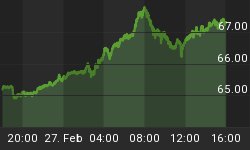It is finally going to be a make or break earnings season for stocks. This is because the justification for record high stock prices that have been perched atop extremely stretched valuation metrics has been the following false assumptions: the hope that the Federal Reserve will not resume its interest rate hiking cycle, the U.S. dollar stops rising, the price of oil enters a sustainable bull market and long-term interest rates continue to fall.
If all those conditions were in place investors could continue to believe a turnaround in the anemic 2% GDP growth rate endured since 2010 was imminent. And, most importantly, that a reversal in the 5 straight quarters of negative earnings on the S&P 500 was just around the corner. Â But even if they were perpetually disappointed in growth and earnings that didn't materialize, they could always afford to wait until the next quarterly earnings report because there just wasn't any alternative to owning stocks.
However, if earnings come in weak for the current quarter—which would be the 6th quarter in a row—that disappointment would occur in the context of a rising U.S. dollar, falling commodity prices, spiking long-term interest rates and a Federal Reserve that will most likely resume its hiking cycle in December. In other words, it would be game over for the equity bubble.
After all, market pundits have placed nearly all of the blame for the negative earnings string on a crashing oil price and a spiking U.S. dollar. However, during the 3rd quarter the WTI Crude price and the dollar were both very stable. And the price of crude was trading in the mid $40 a barrel range for both Q3 2015 and 2016. Therefore, if earnings don't bounce back now how can they be expected to improve in Q4 and beyond, especially while the Fed re-commences its hiking cycle, which should cause the dollar to rise and commodity prices to fall once again?
So how does the earnings season look so far? Industrial and Metals giants such as Honywell, Dover Corporation, PPG Industries, Alcoa and United Technologies have all missed and/or warned on earnings for the third quarter. In the case of worldwide lightweight metals producer Alcoa, (down 11.4% on its earnings report) not only missed bottom line expectations but revenue fell by 6% year over year, which indicates the lack of global growth and demand for industrial metals. Multinational industrial giant Honeywell's CEO Dave Cote said last week that Jet engine service orders, scanners, and logistic and shipping services simply failed to materialize in September. His warning and comments sent the shares down 7.5% last Friday. The company further sited worsening growth in the Middle East, Russia and China.
The free pass on overhyped stock valuations is now over. And with the S&P 500 trading at 25x reported earnings, this market needs a huge revenue and earnings rebound in Q3 or the gravitational forces of rising interest rates will send stock prices significantly lower.
The low on Treasury yields is most likely behind us. In fact, the Ten-year Note yield has risen from 1.36% in July, to 1.8% recently. Indeed, interest rates are rising across the globe as central bankers now believe higher long-term rates and a steeper yield curve are necessary for a healthy banking system. And the Fed has similarly duped itself into believing asset prices are not in a bubble and that borrowing costs can normalize without hurting equity prices and economic growth. However, both assumptions are extremely far removed from reality.
The truth is this protracted economic and earnings malaise—that shows no sign of turning around--coupled with record high stock prices and the reversal of a nearly decade-long zero interest policy on the part of the Fed is clear: a collapse in equity, bond and commodity prices concurrently. The reversal of the central bank's trickle down wealth effect should cause a recession to hit the economy hard by the middle of 2017.
But this next bear market and recession may once again lead to a change in monetary policy on the part of the Fed. Collapsing equity prices and rising bond yields should cause the monetary megalomaniacs on the FOMC to follow up on Ms. Yellen's recent threat to use fiat credit to purchase corporate securities in an attempt to reflate the bubble once again. That is when Pento Portfolio Strategies will close out our current short hedges, aggressively repurchase precious metals and use our substantial amount of spare capital to pick up internationally diversified high-dividend yielding stocks at a steep discount from today's unreasonable prices.
Last December, the Fed's liftoff from ZIRP sent stock prices tumbling over 10%--for their worst start of a year in its history. Investors still have time avoid a similar outcome. But since that correction in equity and bond prices should be enough to tilt this anemic economy into a recession, the cumulative collapse could end up being much worse.















